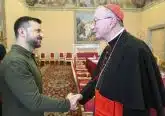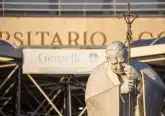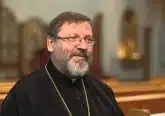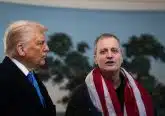Russia’s invasion ‘will probably call for martyrdom,’ leader of US Ukrainian Catholics warns
Washington, D.C. Newsroom, Feb 25, 2022 / 11:12 am
The head of the Ukrainian Catholic Church in the United States says the Russian invasion of Ukraine “will probably call for martyrdom.”
Reacting to the rapid pace of developments on the first day of Russia’s attack, Archbishop Borys Gudziak, the archeparch of the Ukrainian Catholic Archeparchy of Philadelphia, told CNA on Feb. 24 that the “unthinkable is possible” for the Church in Ukraine, calling Russian President Vladimir Putin a “sociopath” who is “leading his own country and neighbors into an abyss.”
Born in New York to Ukrainian immigrants, Gudziak led several church organizations in Ukraine prior to his appointment as the leader of the Ukrainian Greek Catholic Church in America in 2019. He also is the president of the Ukrainian Catholic University in Lviv, Ukraine, and serves as a member of the Permanent Synod of the Ukrainian Greek Catholic Church and as a head of the Department of External Church Relations. Here are the observations he shared with CNA, speaking by telephone from Paris:
What reports are you hearing on the ground from your contacts in the Ukraine?
Well, the Ukrainian army is putting up quite a fight. Many Russian aircrafts have been knocked down. There are a lot of Russian casualties. There’s significant Ukrainian casualties, as well. The Russian armies broke through at eight different points in a horseshoe form around Ukraine, but they’ve been beaten back at some of them. The Russians have captured Chernobyl, the nuclear reactor there, which can be used as a threat. If they blow apart the containment vessel it’ll be radiation, who knows? You know, nobody thought that what is happening would be possible. So the unthinkable is possible for Mr. Putin. President Biden has been saying with certainty for over a week that the invasion is about to happen.
So, you know, people have known this and people have been enduring a war for eight years. So people aren’t soft, you know. Even today there was kind of an early panic in the morning, but then people settled down. In Washington, D.C., if an inch of snow falls there’s a run on the toilet paper. The population knows that panic is what [Russian President Vladimir] Putin wants to create to undermine the social systems, whether it’s banks, whether it’s the economy, whether it’s the stores, the government structures, services, and ministries. So people have been quite disciplined and there’s great resolve. People are joining the territorial defense units. The government is issuing arms to citizens and there’s great preparation for defense of their country, of their liberty, and of their dignity.
How is the Ukrainian Church being affected and how is it responding?
Well, one thing to have as background information is every time that Russia, in the last 200 years, has occupied Ukrainian territory where the Ukrainian Catholic Church existed, the Ukrainian Catholic Church was wiped out. It might not be immediately. It might be in a year or two, or it might be in 20 years or 30 years. But, sooner or later, the visible, public, existence and ministry of the Ukrainian Catholic Church was strangled. And that has happened in the 1820s, in 1870, in 1945, and 1946, and it was happening over these eight years in Crimea and [other Russian-occupied territory.] So our Church realizes that a Russian occupation will, without a doubt, bring persecution to the Ukrainian Catholic Church. It will probably call for martyrdom. The church has said that bishops and priests are going to try to stay in place and be in complete solidarity with the people. But you know, right now issues are being decided with rockets, cannons, guns, and fighter aircrafts. The Church does not necessarily have a common language with that idiom. It cannot respond on that level. It responds in a way that is visible to the eyes of faith. It responds through prayer, through invoking God’s grace, through the sacraments, through healing for presence, healing listening, and moral support for people who are being denigrated and violated.
What is the reasoning for such hostility towards Catholics?
One fundamental reason is the Catholic Church is the Universal Church. And an authoritarian or totalitarian regime, it wants total control. And total control over a community that has a lifeline to Rome and an international network of relationship, that total control can’t be instituted. So just the universal identity of the Catholic Church is a nuisance to dictators. The Catholic Church has a very well-developed social doctrine. It calls a spade a spade, in terms of social issues. It is difficult to limit the teaching of the Catholic Church just to the private sphere. So the Orthodox Church in Soviet times could function, but it couldn’t preach. It couldn’t teach young people. It couldn’t catechize. But you could come and pray privately at church, and there could be a sermon that kind of explained the Gospel for your private life, but not for society. And not for your city or your community. The Catholic Church is dangerous for tyranny and that’s why tyrants attack it.
Have you heard of any destruction towards Catholic churches on the ground?
Not yet. It’s been 12 hours since I’ve been following things, so…
What is your message to the leaders of the Ukraine, Russia, and the United States amid this conflict? I pray for all the leaders. I pray for [Ukrainian President Volodymyr] Zelenskyy to stand strong and to have the strength to guide the defense of the country in a wise way. I pray for Putin to fall on his knees and realize that he will face almighty God at the last judgment. And it seems, he’s violating many of the commandments that our Lord was very explicit about, about harming the little ones and the poor, killing, lying. And I pray that President [Joe] Biden has the courage to lead in the free world much more resolutely, much more decisively than has happened in the Western world since 2014, regarding [the] Russian invasion of Ukraine. This is profoundly undermining international law. This invasion really threatens the foundations of international law, of the global security, and the response needs to be much stronger and much more resolute.
Has there been any dialogue between Catholic and Orthodox church leaders in Ukraine?
There’s the All-Ukrainian Council of Churches in Religious Organizations, which has as members represented, the Orthodox, both Roman and Greek Catholic, the Protestants, Jews, Muslims, and they’re unanimously against this war. Even the members of the Moscow Patriarchy in Ukraine, the head of that Church [Metropolitan Onuphry of Kyiv] came out with a statement. It’s not too much and it’s late, but it’s at least something. He’s condemned the invasion. I think he was in a position to speak prophetically in the last years. And he did not always do that. But, the churches and religious organizations of Ukraine are in harmony regarding the issues of this war.
What’s happening in the United States? How are Ukrainian Catholics in America responding?
Well, we have 200 parishes throughout the country and all of those parishes, in one form or another, have been drives to address the humanitarian crisis over the eight years. So this, for many Americans, is a new story, kind of a new war. For our people, this is a war that’s been going on for eight years and in our parishes, we have special petitions for peace in Ukraine for the last eight years in every liturgy. We’ve had collections for people who have lost their homes, for the refugees, for orphans, for widows, for people that needed prosthetic legs, injured people have been brought to the U.S. for sophisticated operations.
This has been part of our life day in and day out for the past eight years. And it has of course heightened. Now, our parishes and pastors are trying to help people work through this because many have parents, children, close friends, and relatives in Ukraine and they’re very concerned. So, whether it’s prayer, whether it’s coming together in the community to support each other, our parishes have had, unfortunately, a long experience with this war. And these last few days, especially today, have made this experience more excruciating.
How has the recent Russian invasion of Ukraine affected you?
I have a responsibility to lead people in prayer and try to uplift people when they’re down. There’s still a lot of disinformation and ignorance around what is going on in Ukraine and why it is being attacked. So I spend much of the day speaking with the news outlets. And then we’re beginning to organize humanitarian aid for those who are injured by the new invasion. And the refugees, probably already by tonight, are in the hundreds of thousands, but they might be much more.
In a February 2020 interview with CNA, you estimated about 60% of your flock were recent immigrants fleeing the Ukraine. Has that number changed since then? And what do you think will happen now?
That was just on the eve of COVID-19 … I gave that interview while being in Rome. Our flock has not changed very much during COVID. Many people have still not come back to services. Immigration was frozen because of COVID-19. So, there weren’t more coming in, but I think there will be a big influx of refugees into many Western countries as a result of the escalation of the war. That I think is without a doubt.
Is there a specific saint you are praying to for an end to the conflict? And is there any saint that you recommend Catholics turn to during this crisis?
Yesterday I went to Lisieux, and prayed at the place of the relics of St. Thérèse of Lisieux, who was a mystic who died at the age of 24, who led a very simple, pure life. She, during World War I, was seen as a great protector of people caught up in war, of soldiers. And Russian Catholics have her as a special patron saint. And I went to pray there for the conversion of Vladimir Putin. I prayed that through miraculous grace the Lord touch the heart of a man that is a sociopath, who’s killing, and who’s leading his own country and neighbors into an abyss. I prayed to the martyrs of our Ukrainian Catholic Church, who made it through a dark tunnel of Soviet totalitarianism and Russian persecution. I prayed that they give our people, our Church, the strength to endure. I also pray to the Mother of God who endured exile, the fury of a jealous psychopathic, Herod, who in the end walked with her son at the
Way of the Cross and so saw him crucified and endured the agony with the Son of God. I pray to her that she be with the people that are suffering and dying and being killed, being killed as we speak. And I pray to our Lord Jesus Christ, who entered into our sin and into our death, sent by the Father carried by the Holy Spirit.
I pray with great hope God will prevail. His truth will prevail. I’m pained, excruciatingly so, by the suffering, the useless, needless suffering that is being inflicted on people. That is the work of the devil. And it has been throughout human history. I just baptized a little boy before our interview and the boy is the son of a priest. His name is Augustine. I pray for all the people killed today in Ukraine. But I also rejoice at the new life, that Christ is with us. I pray with the consciousness that there’s no greater love than when one gives [one’s] life for their friend. Today many Ukrainians gave their lives for their friends and they will be received into the kingdom for their sacrifice.
What’s your message to all Ukrainians?
Look into the eyes of the Lord before you go to sleep today. He’s with you. He’s counted every hair on your head. He is the God of history and his truth will prevail. Hold your head high. Have hope. Endure everything that you can. Make a contribution for the freedom and dignity of your people.
As the president of the Ukrainian Catholic University, can you just speak to how the conflict is affecting your students?
Before the baptism, I spoke with 30 students who were gathered in a group. They were shaken up this morning, but they were strong this evening. I encouraged them, by the example of their fathers and mothers in the faith. And they’ll do well. They’re not going to give up. They’re not going to allow the genie to be put back into the bottle. They want to be free. They will defend their society.
What can Americans do to help?
Americans can pray. They can be critically informed and call out people like Tucker Carlson and others who are enchanted by President Putin. And they can contribute to addressing the humanitarian crisis. In our Philadelphia Archeparchy website, there’s a way to donate to Catholic charities and Catholic relief services.
You were in Rome last week. Did the Holy Father in your meeting give you any words of consolation or guidance?
His warmth, and welcome, his smile, and his attentive listening has been a consolation for me a number of times when I’ve spoken about the Ukrainian issue. In 2016, I was charged by the head of the church to speak to him about the humanitarian crisis. And I said: ‘Holy Father, I’m gonna say this very simply. This is what they need to hear from the pope. Number one, they need help. Number two, we can help. Three, we will help.’ And the pope took out a piece of paper from his drawer and said, ‘Can you repeat that?’ And within days he announced the humanitarian drive which raised 16 million euros in parishes throughout Catholic Europe. The Holy Father has a heart for the suffering.
Is there anything else you’d like to say to our readers specifically?
We thank you for your solidarity. Help the people through your prayers, through speaking the truth, and through your contributions and you will be awarded by God Almighty.













